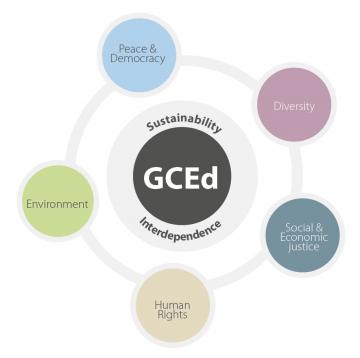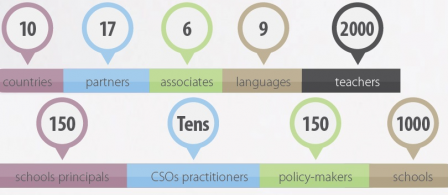Global Citizenship Education (GCE)
The great challenges that humanity is currently facing require that individuals own global competences, and that they contribute with knowledge, skills, values and attitudes to fostering a more sustainable and inclusive world.

As a consequence, education systems are increasingly asked to prepare children and students to understand global issues, as well as to be aware of the impact individual and collective choices have at global level.
«Global citizenship refers to a sense of belonging to a broader community and common humanity. It emphasises political, economic, social and cultural interdependency and interconnectedness between the local, the national and the global» (UNESCO, Global Citizenship Education: Topics and learning objectives - 2015).
Global Schools
Started in 2015, Global Schools is a European project realised in 10 EU countries by 17 partners, led by Autonomous Province of Trento (PAT). It is co-funded by the DEAR Programme of the European Commission.
The three-year-long commitment aims at embedding Global Citizenship Education as a cross-cutting theme, and approach, to all existing subjects of primary school programmes in the partner countries.
In the long run, it strives for a cultural change in schools and in the society at large, aimed at raising a new generation of world citizens motivated by values of solidarity, equality, justice, inclusion, sustainability and cooperation.
Approach
Global Schools brings together research, policy and teaching practice. It conceives GCE as a cross-cutting concept that unfolds in the area where several fields intersect, such as education, development aid, environmental protection, and more. Moving from this assumption, policy coherence becomes a precondition to promote education as a driver for social, cultural, economic and environmental wellbeing and the role of policy makers becomes as crucial as the role of educators.
Global Schools supports the mainstreaming of GCE both through a revision of educational policies and through the promotion of innovative teaching practices and it works at three levels. At the policy level, it advocates for the integration of GCE in educational policies and school curricula in the 10 countries; at the technical level, it supports teachers' motivation and provides continuous professional training both to teachers and to CSOs working in schools, in the effort of embedding GCE in their everyday didactics; at the social level, it encourages parents and the wider community to help children grow into aware and responsible world citizens.
The overall approach is: bottom-up and multilevel moving from the local to the national to the international level; multi-stakeholder as the partnership includes institutions, CSOs, scholars, teachers' training insituties; network-based as it is grounded on the exchange of best practices and on knowledge-sharing at European level.

